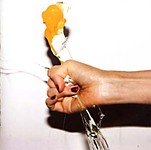Twelve Drummers Drumming
Caroling casualties: The 12 nays of Christmas
By Darcie Stevens, Fri., Dec. 15, 2006
Despite the suggested origin of such an illustrious and repetitive carol, the correlation between geese a-laying, lords a-leaping, and ladies dancing – never mind pipers piping and drummers drumming – and the music industry is obvious. Could the now-anonymous author have been dreaming of an Epiphany for live music venues – happy sound engineers, stage managers, bookers, and brotherly bandmates? We think so.
Given the chance to share industry secrets with you, those folks who present your musical entertainment, make the songs vibrant, and clean up after we've all gone home for a long winter's nap offer up tips of the trade – industry etiquette, if you will. Naturally, your band isn't guilty of these faux pas, so this is your chance to spread the word. Santa will surely be happy enough to set that vintage JC-120 under the tree next to a shiny red Gibson SG.
Don't Bite the Partridge in the Pear Tree: The Club

On the first day of Christmas, the booker said to me, "Don't bitch about the venue!" At least not within earshot of employees, bands, or fans.
"It's always the prima donnas, young industry-made faux bands," Emo's booker Graham Williams says. "The bands that never toured in a beat-up van and slept in it, too. They went straight from their practice space paid for by their parents to a major label and a bus tour. They think, and actually want, all clubs to be plastic, cookie-cutter places like House of Blues. It's unreal.
"We know Emo's is a dump," he continues. "Oddly, that's part of its appeal."
Remember that each show is a step toward something greater, some perfect utopia in which all the drinks are free, all the monitors work perfectly, and all the fans are singing along. One day, the bookers will come to you.
Two Turtle Doves: The Musician and the Media

Bands and journalists have a symbiotic relationship. Believe it or not, we want people to hear your brilliant album. We want to spread the gospel. We want to make you a rock star. That's why we do what we do. Yet when it comes to the interview, not all is smooth sailing.
"Once an interview time is set up, don't try to cancel or reschedule at the last minute," says Asra Syed, assistant producer for KUT's Texas Music Matters. "Our time is precious, too, so don't be late, and don't show up hung-over or stoned. If you are, or aspire to be, a full-time musician, then for God's sake, act like a professional."
The one-on-one can be intimidating for everyone, so please, help us out. We want to hear the tale of your producer spending four hours perfecting the bass sound on the first 30 seconds of the album's closer. We want to hear tour stories from the van's point of view. We really, really, really don't want to ask you – for the millionth time – how you met your bandmates.
"Think ahead about stories to share, and if you're tired of answering the same stock questions, propose a topic you'd like discuss," Syed continues. "Journalists don't want to rehash what's already known about you. We welcome fresh ideas."
Three (Scantily Clad) French Hens: Stage Production

"I know it sounds simple," offers SXSW production manager Leslie Uppinghouse, "but really, the only problems I've ever had with an artist is when they ask for something they don't ever use – five extra mixes – or want – cucumber finger sandwiches and hair dye."
Ah, the joy of a rider. It must be tempting. "All brown M&M's. Four bottles of Maker's Mark with the wax melted off. Ten backup mics, color-coded to the order in which they should be used. The sweat from a young girl's brow." Possibilities are endless, but do you really want to be that rock star?
"Day of show is spent patching in 10 more monitors and building stage extensions for said monitors," sighs Uppinghouse. "The production staff sacrifices their dinner break before doors open, cutting the crust off bread and peeling cucumbers. These peelings and crust hardly sustain them for the moment when the pale-faced whispering pop twosome walks in and complains quietly that they much prefer a stripped down sound system, and could the house please remove these unsightly 'black boxy things'?"
You don't want to be that duo. Keep it simple. Ask for what you really need.
Four Calling Birds: Publicity

A publicist's job is never done. There's always some event, some release, some revolution lingering just over the horizon, and they will be damned if every media outlet within a 100-mile radius doesn't know about it.
"The main thing for an artist to understand about a successful publicity campaign is that we need to be on board as early as possible," Vickie Lucero of local publicity outlet Propaganda Media Group says. "Before you decide on the artwork, before you've booked your CD-release events, and definitely before you've chosen a release date, we need to be a part of the whole planning process."
Or then again, you could just let your e-mails pile up, allow journalists to wonder where you are, miss your interview and photo shoot, and have absolutely no presence outside of your local venues. That's no way to roll. If you want worldwide domination, it's worth biting the buck – literally – and hiring a publicist, many of whom already have longstanding relationships with the media outlets you can't seem to penetrate.
"As in any relationship," concludes Lucero, "communication is key."
The Gold Ring: Labels

With the advent of MySpace, the music world changed.
"Don't think that MySpace can replace a real Web site," counters Austin's Misra Records man Phil Waldorf. "MySpace is great for a quick and easy taste, but aside from what a band sounds like – if you can even get the audio to play – it shows nothing about their aesthetic."
Secretly Canadian co-founder Jonathan Cargill agrees. "I think folks are looking for a more intimate relationship with bands," he says. "MySpace cannot provide that. The beauty of our little indie rock world is that these musicians are not untouchable. Even if they want to be untouchable, they can still foster that connection by posting blogs and free, rare tracks."
The bottom line: A Web presence is more important now than ever.
Six Geese A-Layin': The Band

Okay, the geese have taken flight, and you, poor band member, are killing two birds with one stoned: numbing the pain and/or killing shyness. Still, do you have to down six shots of Jäger before stepping, slobbering, onstage?
"Save your drinking for after you play," relates Sean O'Neal, formerly of This Microwave World and the newly dissolved Arm. "That goes for practice, too. You're not Mötley Crüe, and unless you're good-looking enough to pull off sounding like sloppy, unfocused shit as some sort of 'image,' you need to have most of your faculties. It helps with things like remembering how to play the songs."
What's rock & roll without the booze, you ask? The music.
Seven Swans A-Swigging: Other Acts

Nobody likes setting up. Nobody loves waiting. Not the fans, not the staff, and certainly not the next band on the bill. So, check your ego at the door, and treat this show as the first step in a lifelong career.
"I hate it when bands finish and then take forever getting off the stage," shares Mr. Lewis & the Funeral Five crooner Greg Lewis. "Put your gear away, then try to get chicks. Not the other way around."
This isn't a new sentiment. Show of hands: How many bands have cooled their heals, gear in hand, waiting to take the stage while the previous act peacocks for the opposite sex, orders drinks at the bar, and forgets the roadies stayed home? There's no feeling quite like playing a great show to a receptive audience, but let's TCB before the party starts.
Eight Maids A-Merching

"We consider ourselves very fortunate to have great relationships with bands and labels that realize the value of design and budget appropriately," says the Decoder Ring's Geoff Peveto, poster artist emeritus. "There are too many groups out there that expect design work for free – and get it – from folks who are fans first and designers second. In the end, that practice devalues what we do as an industry and makes it tougher for designers who are actually running a business."
The milk should never stand alone. In a market saturated with a billion bands – most of which, frankly, sound a lot alike – branding your band is nearly as important as the music you play. And despite what some folks might think, flyering and postering is still crucial. Fortunately, Austin's boiling over with graphic designers, extremely talented poster designers, and merchandise houses.
So milk the image for all it's worth. Just remember to pay the milkman.
Nine Lady Lawyers

Okay, you know this. You've heard it a million times. But do you really understand the meaning of mechanicals, master, and sync? Do you understand perpetuity and breakage provisions?
"Bands should never sign a contract without understanding it," emphasizes local entertainment lawyer Amy E. Mitchell, who's also a member of Til We're Blue or Destroy. "At the very least, a band should read the contract before they sign and ask questions if part of a contract doesn't make sense. Many bands are excited that a label or a booking agent or a manager is considering them and think that if they delay in signing, then the label/agent/manager will lose interest. If that were actually the case, then the label/agent/manager probably wasn't that interested in the first place."
The tricky part: You love your bandmates, but maybe all shares aren't equal. Address those issues while everyone still likes one another.
"One of the first things a band should do as they achieve or aspire to achieve success is determine their own internal expectations and put them in writing," says attorney Keaton Clark. "The band agreement, whether formal or informal, should cover division of profits, name ownership, and perhaps even reference the internal decision-making apparatus. Bands are by nature a volatile institution. The fact that a band finally makes some money shouldn't be an additional cause of fracture."
Ten Lords A-Freakin': The Manager

It takes time to gain respect and admiration. It can take years to disseminate one good song across the country. It takes even longer to drive from L.A. to Asheville, N.C. Know what will make that time drag out even longer?
"The biggest mistake that bands make is sitting around waiting for things to happen," says Voxtrot's manager James Minor. "If you're serious and passionate about what you do, don't waste your time waiting to be 'discovered.' Record and release something yourself. Buy a used van and tour as much as possible. If you keep on working hard, people are bound to take notice. Showing music-industry-types not only that you're willing to work hard but also that you've already taken initiative is the most important thing next to having great music."
See, everyone's reiterating the list. Start with great music, add some posters and T's, sign a (fair) contract with your bandmates, design a Web site, and get off your tight-jeaned ass and do something. Sounds like a job doesn't it? That's why the biggest rock stars are always business-savvy.
Eleven Pipers Twiddling Knobs: Producers

There are stories of musicians writing epic albums in studio. Everything just comes together, and brilliance is achieved. In reality, though, unless you're working with a million-dollar budget and your producer is the most patient engineer on the planet, coming into the studio with nothing but your guitar, hangover, and creativity will kill you.
"Rehearse as much as possible before you go into the studio," local producer Erik Wofford says. "There's no such thing as overrehearsing. You'll be making a permanent archive of your material, so you need to be in top form."
Got that? This will go on your permanent record.
"I like for songwriters to have their lyrics well in place before going in to record," agrees producer Michael McCarthy, who's worked with Spoon, Trail of Dead, and Sound Team among many, many other artists. "Of course, instrumental arrangements are important as well, but if the lyrics aren't together ..."
Practice makes perfect. So does scale, structure, tempo, worn strings, new drumheads, and the studio in which you work.
"Don't pick a studio based on fancy toys or a cocky producer," Wofford adds. "Choose an environment you're comfortable in and that will yield suitable results."
Twelve Drummers Drumming? How About One Sound Engineer?

"What's the difference between a sound engineer and a toilet? A toilet only has to deal with one asshole at a time." Chris Payeur knows more than just industry jokes. The Parish's mistress of the soundboard, Payeur's aural manipulation has gained her the reputation as one of the best sound engineers in the city. Payeur's technical fouls:
"Using your own cheap vocal mic is never a good idea. Buy a good one or leave the practice mic at home.
"Give loudest signals at sound check so nothing gets blown up. Blown equipment is not punk rock; it's just lame.
"Despite popular belief, turning up loud can actually make your signal get lost, in addition to clearing the room. A signal that's too loud will create a delay around the room and disappear.
"At least warn the engineers if you're going to go nuts during your set. We can keep a secret and won't worry about our gear."
The most important aspect of a live show, from Jason Morales, Emo's soundman: "Don't be a dick! Our job is only fun when we like who we're mixing, so in the event we don't like your band, at least be pleasant so we might like you as humans."
And the drummer boy strikes his last beat.








